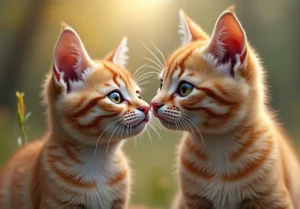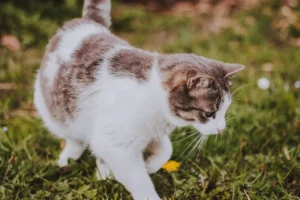Cats are known for their tiny and sharp teeth, but have you ever wondered why their teeth are so small? In this blog post, we will explore the fascinating reasons behind the size of cats’ teeth.
Cats’ teeth are small for a variety of interesting reasons, from their evolutionary history to their unique dietary needs. Let’s uncover the mysteries behind why cats have such petite pearly whites.
Evolutionary Adaptations
Through evolutionary adaptations, cats’ teeth have transformed over time into small, sharp tools designed for hunting and consuming prey efficiently. The process of natural selection has favored cats with specialized teeth that enable them to survive and thrive in their environments.
Cats’ teeth have evolved to be small and pointed, ideal for piercing through flesh and tearing meat. The sharpness of their teeth allows them to quickly dispatch their prey and consume it with ease. Additionally, their teeth are perfectly suited for grooming, helping them keep their fur clean and free of parasites.
One interesting evolutionary adaptation of cats’ teeth is the presence of specialized carnassial teeth. These are large teeth located at the back of the mouth that are used for slicing through tough flesh and bone. The development of these carnassial teeth has been crucial for cats in their role as carnivorous predators.
Carnivorous Diet
Cats’ teeth are perfectly designed for their carnivorous diet, which consists mainly of meat. Their sharp, pointed teeth are ideal for tearing into flesh and consuming protein-rich foods. Unlike herbivores or omnivores, cats do not need flat, grinding teeth for chewing plant matter or processing a varied diet.
Because of their specialized teeth, cats are able to efficiently consume and digest meat, extracting the nutrients they need for energy and growth. Their sharp teeth allow them to efficiently tear and chew their food, aiding in the digestion process and ensuring they receive all the necessary nutrients from their prey.
In addition to their teeth, cats have a strong jaw and powerful muscles that work together to help them effectively capture and consume their prey. This combination of adaptations makes cats formidable hunters and efficient meat-eaters, perfectly suited for their carnivorous lifestyle.
- Cats’ teeth are uniquely adapted for a meat-based diet, lacking the flat molars needed for grinding plant matter.
- The sharpness of their teeth allows cats to tear into flesh and consume meat efficiently without the need for extensive chewing.
- Their jaw structure and powerful muscles further enhance their ability to capture and devour prey effectively.
Dental Structure
Cats have small teeth compared to other animals, and it’s all thanks to their unique dental structure. Unlike larger animals, cats are obligate carnivores, meaning their diet consists mainly of meat. This specialized diet has influenced the evolution of their teeth, resulting in smaller, sharper teeth that are perfectly adapted for tearing and shearing meat.
One interesting feature of cats’ teeth is their sharp cusps, which help them efficiently slice through tough meat and bones. Additionally, their small teeth are closely packed together, allowing for precise control and manipulation while eating. This dental structure not only aids in their hunting and feeding behaviors but also helps them maintain their overall oral health.
Dental Health
The size of cats’ teeth plays a crucial role in their dental health and wellbeing. Due to their small teeth, cats are prone to dental issues such as tartar buildup, gingivitis, and periodontal disease. Regular dental care is essential to prevent these problems and ensure your feline friend’s teeth stay healthy.
To help maintain your cat’s dental health, consider incorporating dental treats or toys into their routine. These can help reduce plaque and tartar buildup, keeping their teeth clean and their gums healthy. Additionally, regular veterinary check-ups that include a dental exam can catch any issues early on and prevent more serious dental problems down the line.
Additional Insight:
Proper dental care is essential for your cat’s overall health, as dental issues can impact their quality of life and even lead to more severe health problems if left untreated. Regular brushing and professional cleanings can go a long way in ensuring your cat’s teeth stay strong and healthy.
Kitten Development
Have you ever wondered why cats have such small teeth? Well, it all starts with their development as kittens. Just like humans, cats are born without teeth. Around two weeks of age, their baby teeth, also known as deciduous teeth, start to come in. By the time they are seven weeks old, kittens usually have a full set of 26 baby teeth. These small teeth are sharp and help them nurse from their mother.
As kittens grow, their adult teeth begin to replace their baby teeth. Around three to four months old, their adult teeth start coming in, pushing out the baby teeth. By the time a cat reaches six months of age, they typically have all 30 of their adult teeth. These adult teeth are smaller compared to other animals because cats are obligate carnivores, meaning their diet consists mainly of meat.
Interesting Facts
Now, let’s delve into some interesting trivia about why cats’ teeth are so small. Did you know that a cat’s teeth are designed for hunting and tearing meat? Their sharp incisors are perfect for grabbing and pulling, while their pointy canines help them deliver a lethal bite to their prey. Additionally, cats have specialized teeth called carnassial teeth that are like scissors, used for shearing meat efficiently.
- Fun Fact: Cats have a unique dental structure that allows them to be such effective predators. Their teeth are designed to help them catch and devour their prey with precision and ease.
So, the next time you see your feline friend nibbling on their food or playing with a toy, remember that their small teeth are perfectly suited for their carnivorous lifestyle.
#
Cats have small teeth compared to other animals because of their evolutionary history as obligate carnivores. This means their teeth are designed for tearing into meat rather than grinding plants. Their sharp teeth are ideal for hunting and consuming prey efficiently.
Comparison to Other Animals
When it comes to tooth size, cats fall on the smaller end of the spectrum compared to many other animals. For example, a lion’s teeth are much larger and designed for crushing bones, while a cow’s teeth are large and suited for grinding tough plant material. Cats have smaller teeth because they primarily eat meat, which doesn’t require extensive chewing like plant material does. So, their teeth are sharp and pointed to tear into flesh easily.
Breeds and Variations
Just like there are variations in fur color and body size among cat breeds, there can also be differences in the size and shape of their teeth. For example, breeds like the Siamese may have slightly smaller teeth compared to breeds like the Maine Coon, which are known for their larger size. These variations are often due to genetics and the specific traits that have been bred into each type of cat.
Extra tip: Regular dental care, such as brushing your cat’s teeth or providing dental treats, can help maintain their oral health and prevent dental issues in the long run.
Tooth Care Tips
Cats have small teeth compared to other animals like dogs because of their diet in the wild. While their teeth may be petite, they still require proper care to keep them healthy. Here are some useful tooth care tips for your feline friend:
- Brush regularly: Just like humans, cats need their teeth brushed regularly to prevent plaque buildup and dental issues. Use a toothbrush designed for cats and toothpaste approved by your veterinarian.
- Provide dental treats: Dental treats can help reduce plaque and tartar buildup on your cat’s teeth. Look for treats that are specifically formulated to promote dental health.
- Regular check-ups: Schedule regular dental check-ups with your veterinarian to catch any potential issues early and ensure your cat’s teeth and gums are in good condition.
- Healthy diet: Feeding your cat a balanced diet that promotes dental health, such as crunchy kibble or dental-specific food, can help maintain their oral hygiene.
By following these tips, you can help keep your cat’s teeth healthy and strong, despite their small size.
Behavioral Implications
The size of a cat’s teeth can have interesting behavioral implications that affect how they interact with their environment. Cats’ teeth may be small, but their sharpness serves specific purposes:
- Hunting: Cats have sharp, small teeth that are designed to grab and hold onto their prey effectively. This enables them to hunt efficiently in the wild.
- Defensive mechanisms: Small teeth also play a role in a cat’s defensive instincts. When threatened or feeling cornered, a cat may bare its small but sharp teeth as a warning to potential threats.
- Grooming: Cats use their teeth not only for eating but also for grooming. Their small teeth help them clean their fur and remove any debris or parasites that may be present.
Understanding the behavioral implications of a cat’s small teeth can help you better appreciate your feline friend’s instincts and interactions with their surroundings.
Dental Issues
So, let’s talk about common dental issues that our feline friends may encounter due to their petite pearly whites. One major concern is dental plaque buildup, which can lead to tartar and gingivitis if not properly managed. This can result in bad breath, painful gums, and even tooth loss. To prevent this, regular dental check-ups by a veterinarian are crucial. You can also introduce dental treats or toys designed to promote oral health.
Another issue to watch out for is feline odontoclastic resorptive lesions (FORLs). These painful lesions can occur along the tooth roots, causing discomfort and potential infections. Professional dental cleanings and addressing any affected teeth promptly are key in managing this condition. Remember, preventive care is always better than treatment after the fact.
Additionally, some cats may experience broken or chipped teeth, often a result of trauma or chewing on hard objects. Not only can this be painful, but it can also lead to infections if left untreated. If you notice any abnormalities in your cat’s teeth, don’t hesitate to seek veterinary advice. Early intervention can prevent further complications down the road.
Remember, our feline companions rely on us to take care of their oral health. By staying proactive and attentive to any changes in their dental well-being, we can help keep their small but mighty teeth in tip-top shape.
- Watch out for signs of dental issues such as bad breath, reluctance to eat, and pawing at the mouth.
- Provide appropriate dental care through regular check-ups, dental treats, and toys.
- Address any dental problems promptly to prevent further complications.
- Consider professional dental cleanings to maintain your cat’s oral health.
- Monitor your cat’s oral hygiene regularly to catch any issues early on.
Alex, a passionate animal lover, has experience in training and understanding animal behavior. As a proud pet parent to two dogs and three cats, he founded AnimalReport.net to share insights from animal experts and expand his knowledge of the animal kingdom.




